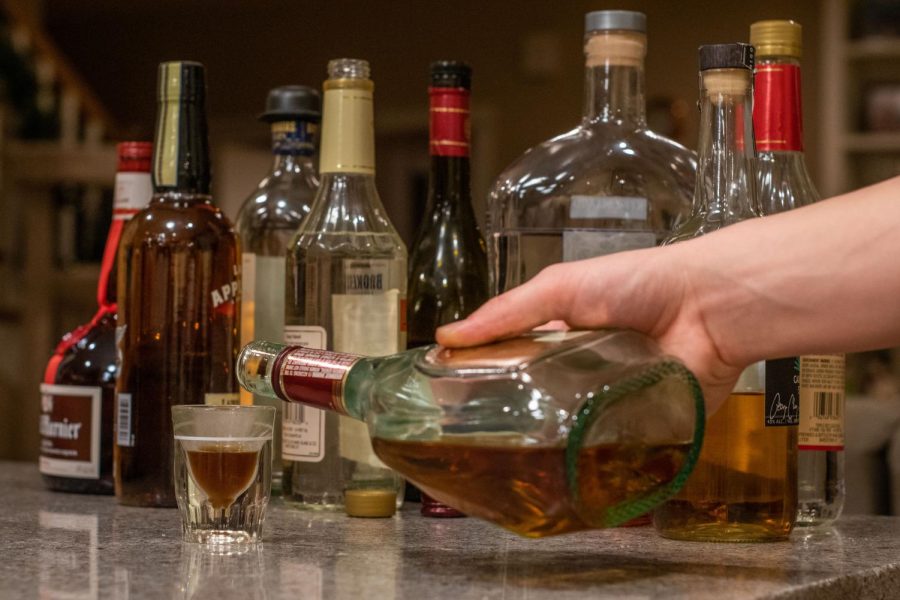Concerned experts unclear on teen substance use trends
December 11, 2020
Although some national data has been collected on the increase in substance use among adults, studies and data have not been finalized for substance use changes among teenagers.
With students managing U-High’s intense workload, isolated from their social circles and under the stress of living through a global health crisis, it takes no stretch of the imagination to count substance use as one of the many impacted behaviors in the lives of U-High students.
Yet, given a lack of statistics on teen substance use during the pandemic and seeming silence between students and high school counselors on the issue, it’s hard to tell exactly how students’ relationships with substances like alcohol, e-cigarettes and other drugs has changed in the past eight months during a pandemic and distance learning.
According to high school counselor Aria Choi, students have been coming to the counselors for help dealing with heightened anxiety and depression during the pandemic. Despite this, she said no students have reached out to her about substance use.
“I personally, of the five school counselors, have not received any reports of concerns with substance abuse or addiction,” Ms. Choi said. “I am also not hearing from my colleagues that they are working with students who are recording issues with substance use, it’s more again, depression, anxiety.”
This lack of communication is not new. Ms. Choi said in her four years at U-High she has only talked about substance use with two students.
Just because students have not been reaching out to the high school counselors does not mean they have avoided substance use altogether. The 2019 wellness survey reported that 38% of U-High students have had more than a few sips of alcohol, 30% have used vapor products and 25% have used marijuana.
The high school counselors aren’t the only ones finding themselves in the dark about how teens are using substances right now. There aren’t many published studies on the topic, so knowledge directly about teenage substance use trends during the pandemic is also mainly speculative, according to Andrea King, professor of psychiatry and behavioral neuroscience at the University of Chicago and a Lab parent.
“We don’t know a whole lot because it takes time to get really good data and have it published, and peer reviewed, and all those things. So I know, these data are being collected,” Dr.. King said.
Even with hard data, it could be difficult to pin down a definitive trend. According to Dr. King, the impacts of the coronavirus on a teen’s life and substance use habits vary geographically. Risk factors such as poverty and drug availability may also lead to various behaviors among teens.
“So there’s probably going to end up being a mixed bag of some kids who might have gone on and used substances this year who aren’t using them,” Dr. King said. “That may be good, and it could delay the onset. And for others, it could deepen maybe some disturbing trends they already had, and make them even more hardcore.”
Despite the lack of specific data, figures on general nationwide substance use and mental health may provide a slightly clearer picture of teen substance use as influenced by pandemic.
A study published in August by the Centers for Disease Control and Prevention showed the pandemic had the greatest impact on the mental health of young adults ages 18-24, with nearly 63% of respondents in this age group reporting symptoms of anxiety or depression related to the pandemic, and around 24.7% turning to substance use as a coping mechanism.
A study of high school students found that the effects of isolation during the pandemic has adverse effects on teen mental health in particular. A recent study of 3,300 high school students published by America’s Promise Alliance showed that 30% of respondents reported feeling depressed or unhappy, while 29% felt disconnected from their school communities.
U-High counselor Micheal Bruner is concerned about the new role isolation plays in teen substance use, and encourages students who may be struggling with addiction to seek support.
“Many students are reporting feeling disconnected. So I certainly worry about those things and my hope is that students, if they’re feeling those things, they’re able to reach out to resources that they have available to them,” Mr. Bruner said. “That might be family, that could certainly be the counselors here at school, other adults that they’re close with and even their friends to some extent, especially friends who are able to engage with them in healthy ways.”
Dr. King suggested that students struggling with addiction avoid substance-using friends who aren’t similarly committed to getting clean should look into online resources like Partnership to End Addiction and talk to trusted adults.
According to Dr. King, setting up time away from a substance can also help students experiment with finding alternative coping mechanisms.
“I suggest at least one month to give enough time to make these lifestyle changes, and three or more months is even better,” Dr. King said. “Many find that they have better alternatives and decide using drugs makes them feel worse in the long run and having this time away from using helps to make that clear.”
